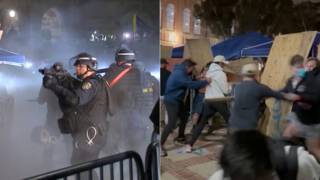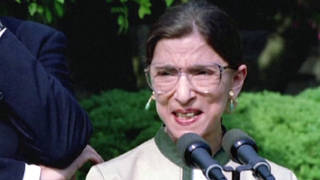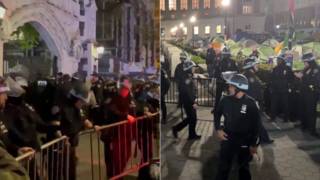
Related
Guests
- Dahlia Lithwicksenior editor at Slate, where she is the senior legal correspondent and Supreme Court reporter.
We look at the life and legacy of Ruth Bader Ginsburg, as well as the future of the Supreme Court, in a wide-ranging interview with Dahlia Lithwick, senior editor at Slate, where she is the senior legal correspondent and Supreme Court reporter. Ginsburg died September 18 at the age of 87 after serving 27 years as a Supreme Court justice, where she became the most prominent member of the court’s liberal wing. Her death just 46 days before the November election sets up a major political battle over her replacement, with President Trump vowing to nominate her replacement by Saturday. In 2016, Senate Majority Leader Mitch McConnell refused to hold confirmation hearings for Merrick Garland, President Obama’s pick to replace Justice Antonin Scalia, who died 269 days before the election. “Hypocrisy doesn’t begin to touch on that,” says Lithwick. “The court is profoundly misaligned both with popular opinion polling and with the will of this country.”
Transcript
AMY GOODMAN: We spend the hour looking at the life and legacy of Ruth Bader Ginsburg, as well as the future of the Supreme Court. Ginsburg died on Friday at the age of 87 after serving 27 years as a Supreme Court justice, becoming the most prominent member of the court’s liberal wing.
Ginsburg first gained fame in the 1970s, when she co-founded the Women’s Rights Project at the American Civil Liberties Union, where she argued six gender discrimination cases before the Supreme Court, winning five. She once famously quoted the abolitionist Sarah Grimké during one of her oral arguments.
RUTH BADER GINSBURG: In asking the court to declare sex a suspect criterion, we urge a position forcibly stated in 1837 by Sarah Grimké, noted abolitionist and advocate of equal rights for men and women. She said, “I ask no favor for my sex. All I ask of our brethren is that they take their feet off our necks.”
AMY GOODMAN: Ruth Bader Ginsburg became a federal appellate judge in 1980, then, in 1993, was sworn in as just the second female Supreme Court justice. During her Senate confirmation hearing, she openly defended the right to have an abortion.
JUDGE RUTH BADER GINSBURG: This is something central to a woman’s life, to her dignity. It’s a decision that she must make for herself. And when government controls that decision for her, she’s being treated as less than a fully adult human responsible for her own choices.
AMY GOODMAN: The Senate confirmed Ginsburg 96 to 3.
As a Supreme Court justice, she was a strong supporter of reproductive rights, women’s rights, expanding LGBTQ rights and preserving President Obama’s Affordable Care Act.
Some of Ginsburg’s most memorable opinions were dissents. In 2013, she dissented when the court struck down a key section of the Voting Rights Act. She wrote, quote, “Throwing out preclearance when it has worked and is continuing to work to stop discriminatory changes is like throwing away your umbrella in a rainstorm because you are not getting wet,” unquote.
While Ginsburg was known to be a leader on the court’s liberal wing, she sometimes sided with her conservative colleagues. She joined the conservative majority approving a natural gas pipeline being built under the Appalachian Trail. She also approved the Trump administration’s policy of expediting deportation of people seeking asylum.
Ginsburg’s death has set off a battle in Washington. She died on September 18, just 46 days before the November election. In 2016, Senate Majority Leader Mitch McConnell refused to hold confirmation hearings for Merrick Garland, President Obama’s pick to replace Justice Antonin Scalia, who died nearly nine months before the election. At the time, McConnell said, quote, “The American people should have a voice in the selection of their next Supreme Court justice.” But now McConnell has vowed to hold a vote on Trump’s pick to replace Ginsburg, setting off a battle in the Senate, where the Republicans maintain a 53-to-47 advantage. The Democrats need 51 votes to block a potential nominee. Two Republican senators, Lisa Murkowski and Susan Collins, have already said they oppose voting on Ginsburg’s replacement before the election.
President Trump is expected to nominate a replacement for Ginsburg as soon as Tuesday. Top contenders include federal judges Barbara Lagoa and Amy Coney Barrett. If the Senate confirms Trump’s nominee, it will give conservatives a 6-to-3 advantage on the court. It would also mean the majority of the justices on the court were selected by presidents that did not win the popular vote.
Days before she died, Justice Ginsburg [dictated] a final statement to her granddaughter. It read, quote, “My most fervent wish is that I will not be replaced until a new president is installed,” unquote.
Over the weekend, vigils were held outside the Supreme Court and across the country to remember Ruth Bader Ginsburg.
Later in the program, we’ll be joined by a man Ginsburg once called her favorite plaintiff, and we’ll be joined by Julie Cohen, co-director of the Oscar-nominated documentary RBG. But we begin today’s show with Dahlia Lithwick. She’s senior legal correspondent at Slate.com, her latest piece headlined “What Ruth Bader Ginsburg Would Want America to Do Now.”
Well, Dahlia, welcome to Democracy Now! Thanks so much for joining us. I know this is a deeply painful day to you both personally and politically. Talk about how you came to know Justice Ginsburg, what she meant to you, and then what you think about what’s happening today.
DAHLIA LITHWICK: Thanks, Amy. And thanks for having me.
I got to know her, actually, latish in my career. I had been covering the court for some time, and Justice Ginsburg gave an interview to The Wall Street Journal's Jess Bravin, and he asked her who she read. And she named a couple people, and then she said, “Oh, I read that girl at Slate, Dahlia Lithwick.” And then she called me “spicy.” And I think she liked the fact that I was irreverent. And shortly after that, I got to interview her for the first time when Glamour named her their woman of the year, and she gave me an amazing interview. And then, just most recently, I got to sit down with her actually in late January, right before the court shut down for COVID. I got to spend an hour with her just talking about her experience being one of nine women who started at Harvard Law school in a class of 500 men. And so, I've just been incredibly blessed in my connections to her.
And, you know, as to what she meant to me, I mean, I started law school just as she was being elevated to the bench. And I think I can say, with great confidence, that had I not seen Sandra Day O’Connor and Ruth Bader Ginsburg on the Supreme Court, I would not, probably, have felt that there was a place for me at law school. I know thousands and thousands of women feel the same. And then, simply as a marker of what a woman can do, who at every turn is faced with closed doors, lost opportunities, unbelievable discrimination, and how at every turn she took that, turned it around and turned it into another success. I just think the arc of her life, Amy, has been to fight for the women who came after and to bear the responsibility of the women who came before who couldn’t finish the fight.
AMY GOODMAN: So, talk about what you feel are her most important contributions.
DAHLIA LITHWICK: Well, I think you’ve identified — I think she sort of has three acts in America. The first is her unbelievable litigation career. At the Women’s Rights Project at the ACLU, she almost single-handedly became the architect of a series of what looked to be small, incremental cases that fought consistently to do away with gender discrimination as built in the law. And, of course, the genius of those cases — I know you’re going to talk about this later — is that she would bring them on behalf of men, not women, but men who were subject to discriminatory laws because the law assumed that men went out to work and women stayed home as caregivers. And she built, slowly, the same way Thurgood Marshall built in the world of race equality, one case after another after another that dismantled that patriarchal view of the world. And so, there’s that piece of it, which is the legal career that ends up really enforcing the idea of equality under the Constitution.
Then there’s her time on the court and the enormous series of cases she both authored and later dissented in, where she put that into effect, most famously when the Virginia Military Institute — she forced them to accept women cadets, writing that it is discriminatory to assume that women cadets can’t go to that school — changed the landscape forever.
And then, I think, this third act, which we really only saw in the last decade, where she became this tiny, five-foot, less-than-a-hundred-pound rockstar, when she became “Notorious RBG,” and everyone had a tote bag, and everybody had the earrings, and everybody knew her dissents by heart. She became larger than life, certainly larger than one associate justice on the court. And I think she just became a symbol, particularly in the last four years, for women who felt powerless and hopeless, that you don’t get to feel powerless and hopeless. You just keep fighting.
AMY GOODMAN: And how she became “The Notorious RBG”?
DAHLIA LITHWICK: It came from, you know, toward the end of her career. She was writing — I think you noted this, Amy — many more dissents than she was writing majority opinions. And her dissent in the Shelby County case, the one that gutted the heart of the Voting Rights Act, that line about doing away with preclearance is like chucking your umbrella because it worked, that got set to music. And a whole bunch of young women really, I think, constructed this idea that she was in fact not all that different from a rapper, and that she was this icon and that her words needed to be disseminated beyond the four corners of opinions out into the world. At that point, her Hobby Lobby dissent then was also set to music.
Time and time and time again, things that she did that might have been ignored by mass culture got pushed out under the guise of this is this tiny little woman with the tilted crown. She is changing the world, not within the auspices of the court — she’s writing dissent — but the words that she is giving, particularly to young people and particularly to young women, the language of dissent, the language of using the law and your words to effect change. It just became a phenomenon, the likes of which I’ve never seen on the court.
AMY GOODMAN: But, Dahlia Lithwick, she certainly wasn’t the most progressive member — probably Sonia Sotomayor is. And in the last years, she sided with the conservative majority when it came to building a natural gas pipeline, when it came to approving the Trump administration’s policy of expediting deportation of people seeking asylum, even, well, ultimately apologized for calling Colin Kaepernick’s move to take a knee “dumb.”
DAHLIA LITHWICK: I think that the ways that we misapprehend Ruth Bader Ginsburg are really at the core of what you just said, which is I really truly believe that she was the most small-C conservative radical on the court, and that if you thought she was out on the hustings burning her bra, breaking things down, taking things apart, then you kind of missed the real story, because she was fundamentally a creature of the 1950s and ’60s. She was very, very much not a ’70s radical, certainly not a pink pussy hat radical.
She was someone who, when she was on the D.C. Circuit Court of Appeals, the lower federal court, aligned her votes with Robert Bork and Antonin Scalia, more than anyone else. She was fundamentally a moderate centrist, often conservative, jurist. She was very, very, very much given a knock for not hiring nearly enough minority clerks. All of that is part of the picture.
AMY GOODMAN: Had one African American clerk as a Supreme Court justice.
DAHLIA LITHWICK: And I think we have to be very, very honest about the fact that she was both the architect of the gender equality world we live in now and also that she was very, very effective in part because she was a get-along person. She was very much conciliatory, always cared about decorum, meeting people where they were. She was both those things, Amy, and I think, in some ways, we have to respect both parts of it.
AMY GOODMAN: I want to turn to Donald Trump now at the North Carolina rally he held on Saturday, where he said he plans to nominate a woman to replace Justice Ruth Bader Ginsburg, and seemed to imply he had until Inauguration Day 2021.
PRESIDENT DONALD TRUMP: Both the White House and the Senate majority have a moral duty to fulfill the promises they made to the voters. And that is exactly what we’re going to do. We said that if, for any reason, we have a vacancy on the United States Supreme Court, we will fill that vacancy. We’re not going to say — and, by the way, we have plenty of time. There’s a lot of time. You know, you’re talking about — you’re talking about January 20th, right?
TRUMP SUPPORTERS: Fill her seat! Fill her seat! Fill her seat! Fill her seat!
AMY GOODMAN: So, you can hear the people chanting “Fill her seat! Fill her seat!” Trump now nominating a third justice to a lifetime apartment on the Supreme Court. If you could talk about what he said he’s going to do, who some of the top candidates are to fill Ruth Bader Ginsburg’s place?
DAHLIA LITHWICK: I think the single most important thing to do is not waste a lot of our brain cells trying to reconcile the message that he and Mitch McConnell are putting out now with the message that Mitch McConnell put out in 2016, where, with nine months left to go, they said, “It’s too — way, way, way too late for a president to nominate someone. We’re going to let the voters decide.” I think we can agree hypocrisy doesn’t begin to touch on that.
And so, then the question is: Can he rush someone through? I should just note for your audience that the polling I saw, effective yesterday, said 63% of the country, including 50% of Republicans, don’t think somebody should be jammed onto the court just in order to fill the seat. But I guess he’s going to press through.
The folks who are on the shortlist, he has said he wants to nominate a woman, so it’s largely women. Probably the front-runner is Amy Coney Barrett. He said, when he had her on the shortlist for what ultimately became the Kavanaugh seat, that he was saving her for when he could fill the Ginsburg seat. So I think she’s probably the top contender, and she’s also been fully vetted. She’s only 48 years old. She sits on the 7th Circuit Court of Appeals. And I think all of the nominees that he’s looking at are people in their late forties, early fifties, with very, very, very compressed judicial records. She’s only been on the bench for a couple of years. But I think it’s fair to say that on case after case after case, including abortion, including age discrimination, asylum seekers and guns, she has been on the hard, hard-right side of the fence, often in fact getting disdainful statements from Reagan and Bush appointees about how radical her worldview is. The other thing about her is she very, very much has written about how religion informs her judicial thinking. And when that was raised at her lower court hearings, it was seen as a huge, huge affront. So, she brings to the table the ability to be deeply religious, and it’s impolitic, apparently, to question her about it.
Barbara Lagoa is now on the shortlist. She’s only 52. She’s on the 11th Circuit. She’s one of the judges who just ruled that all of those taxes and fees that felons need to pay prior to voting is not a poll tax and that that can be enforced, which would disenfranchise thousands and thousands of formerly reenfranchised felons in Florida.
Joan Larsen is probably the third person on the shortlist. Only —
AMY GOODMAN: And just to say, on the issue of Lagoa, she is Cuban American. She is from the swing state of Florida. A Latinx swing state person on the Supreme Court would serve President Trump, in his eyes.
DAHLIA LITHWICK: Would serve him well in Florida. And also she’s a DeSantis acolyte, so I think that that shores up Florida.
Joan Larsen is the last person, 51 years old, on the 6th Circuit. But I think he’s — Trump is still looking at several other very, very young women. We will know, I guess, as soon as tomorrow who he settles on.
AMY GOODMAN: I wanted to, finally, turn to Alexandria Ocasio-Cortez. On Sunday, she and the Senate Democratic Leader Chuck Schumer went to Ruth Bader Ginsburg’s high school, which is also Schumer’s high school, James Madison in Brooklyn, and urged supporters to call on Senate Republicans not to vote on any Supreme Court nominee.
REP. ALEXANDRIA OCASIO-CORTEZ: We must use every tool at our disposal, from everyday people, especially in swing states. We need everyday people to call on senators, to call on folks on the bubble, to call Republican senators, to make sure that they hold us vacancy open. And we must also commit to using every procedural tool available to us to ensure that we buy ourselves the time necessary.
AMY GOODMAN: That’s Congressmember Alexandria Ocasio-Cortez. It’s pretty rare to see her and Chuck Schumer together. They were by themselves in front of James Madison High School. But, Dahlia Lithwick, what are those things you think could be done right now for people deeply concerned about a third Trump appointment to the Supreme Court?
DAHLIA LITHWICK: I think they have to make noise, and I think that’s what she was saying. I think you led with this. It’s so important. It cannot be the case that Dems have won the popular vote in seven out of the eight elections from 1992 ’til now, and yet the GOP has appointed 14 out of 18, now seek 15 out of 19, Supreme Court seats. It is a majority — a minority-majority court, because minority-majority presidents and a minority-majority Senate keep ratifying it.
And I think what she’s saying is, we have to stop behaving as though the court belongs to the Republicans. They campaign on it. They vote on it. It’s a single-minded issue for them. And Democrats have tended, in the last few election cycles, to not step up, to act as though maybe we just rent seats there occasionally. The court is so profoundly misaligned both with popular opinion polling and with the will of this country. And I think the idea that you just accede to that because it’s not an issue for Democrats is what is really, really going to have to change.
And so I think she’s right. It means calling your senators. It means writing the op-eds, writing the letters and really, really signaling to the Senate that votes will move, votes will be lost, seats will be lost, if what is done in the next couple of weeks is allowed to go through.
AMY GOODMAN: And the possibility of a Biden administration increasing the number of justices on the court?
DAHLIA LITHWICK: Well, you heard AOC say it. I think that none of the structural court reforms that are being floated, whether it’s term limits, whether it’s adding seats to the lower courts and the Supreme Court, whether it’s jurisdiction stripping — there are a lot of really, really thoughtful ideas circulating about how we do structural court reform to kind of reverse the minority-majority rule that has absolutely taken a hold in this country. And I think what she’s saying is, we can’t be afraid to say there will be consequences if the court is treated as though it’s Mitch McConnell and Donald Trump’s plaything.
AMY GOODMAN: Dahlia Lithwick, thanks so much for being with us. And condolences to you, because this is a personal loss, as well, for you, interviewing her just before the COVID lockdown. Dahlia Lithwick, senior editor at Slate.com, senior legal correspondent and Supreme Court reporter. Her latest piece, we’ll link to, “What Ruth Bader Ginsburg Would Want America to Do Now.”
When we come back, we turn to one of the directors of the Oscar-nominated documentary RBG, Julie Cohen. Stay with us.
[break]
AMY GOODMAN: “We Shall Be Known,” being sung at a Saturday vigil outside the Supreme Court for Ruth Bader Ginsburg.












Media Options